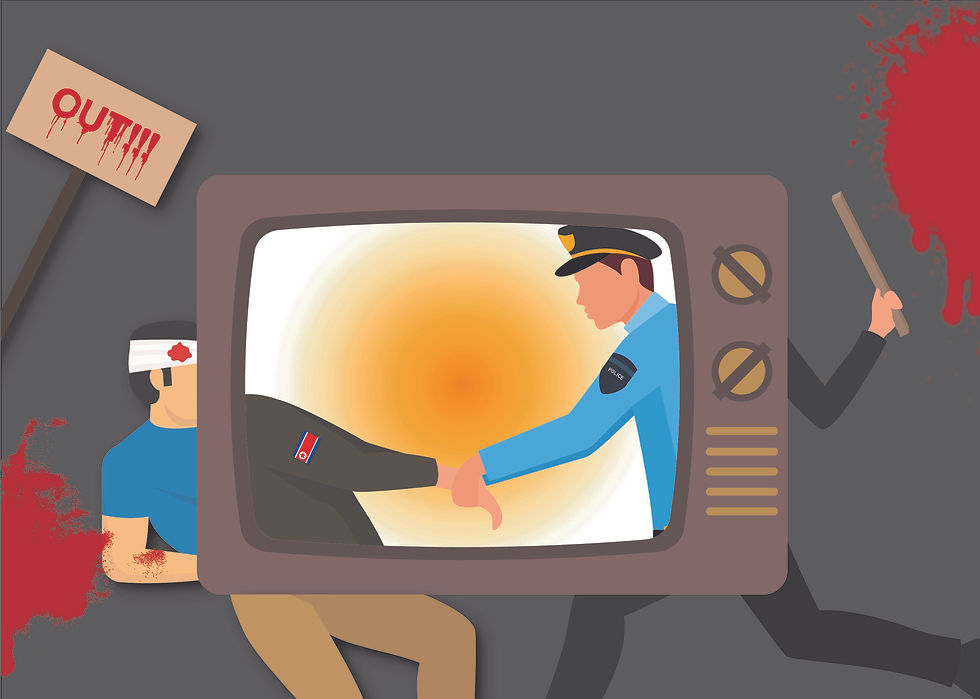[History] Snowdrop: Time to Be Wary of Accepting History Conveyed Through TV
- Lee Noo-ri

- 2022년 3월 11일
- 2분 분량
No. 156 / Mar 7, 2022

The drama Snowdrop, which aired on the Joongang Tongyang Broadcasting Company (JTBC), was embroiled in controversy over the historical distortion presented in it. Controversy emerged about whether the drama disparaged and distorted the democratization movement in Korea in the 1980s. In response, 360,000 people participated in the Blue House national petition for the abolition of the drama and 900 complaints were filed by the Korea Communications Commission. Set in Seoul in 1987, the drama Snowdrop featured the North Korean spy Suho and female college student Youngro as the main characters. The controversial aspect was the addition of the element of a “North Korean spy” to Seoul, where the democratization uprising was in full swing. The male protagonist, a North Korean spy, did not participate directly in the democratization movement. People around them, especially the female protagonist, mistook the male protagonist Suho for a student who participated the democratization movement. In addition, students working as activists helped spies, and the spies expressed that students who campaigned for democratization appeared cool. Naturally, this depiction overlapped with the existence of Rumor that North Korean spies are involved in the democratization protests. The concept of this drama has drawn public resentment because people who campaigned for democratization in the 1980s were accused of espionage, tortured, and sentenced unfairly. In this context, Lee Kyung-ran, the director of the Lee Han-yeol Memorial Museum, said, “The democratization movement, including the Gwangju Democratic Uprising is a resistance movement against dictators who slaughter citizens, and establishing a story-telling connection with North Korea itself is a distortion and insult to history”.
In addition, in the introduction of the drama, employees of the Agency for National Security Planning (ANSP) appear to be important characters. Introducing a character as an employee of the ANSP, and the director describes him, “an upright person who does not compromise under any circumstances,” and “a man who has only walked on one path to catch Reds”. In addition, he created a character who was disillusioned with the ANSP, and another character became an ANSP agent for no other purpose than to catch his boyfriend. In this drama, the ANSP criticized committing violence during the democratization process. However, it also provided several personal narratives of individuals in the organization. Viewers who watched it recognized that they were evil people who had committed crimes, but empathized with the characters who experienced stories similar to their own. It should be noted that, if an individual has participated in a criminal act in any organized or personal scenario, it cannot be justified for any reason, and no crime is committed “by accident” This also relates to the recent social voice of “Don’t give narrative to crime”.
Recently, controversy over the distortion of the history conveyed through dramas such as Snowdrop, Joseon Exorcist, and Mr. Queen has arisen. While enjoying interesting media content, people may unknowingly accept an inaccurate view of history. Accepting everything presented in a drama can be dangerous. As viewers, it is necessary to have an attitude to learn about the history conveyed in dramas.
By Lee Noo-ri AG Senior Editor
cabello1706@ajou.ac.kr
![[History] Celebrate Dokdo Day, Not Takeshima Day](https://static.wixstatic.com/media/c71c22_2d32886e5721419b92649e7dc82f3cb8~mv2.jpg/v1/fill/w_766,h_285,al_c,q_80,enc_avif,quality_auto/c71c22_2d32886e5721419b92649e7dc82f3cb8~mv2.jpg)
![[History] We Are Descendants of Goguryeo and Balhae!](https://static.wixstatic.com/media/c71c22_f170e7b91a094cd9a4a6f2bcfd2006ad~mv2.jpg/v1/fill/w_768,h_544,al_c,q_85,enc_avif,quality_auto/c71c22_f170e7b91a094cd9a4a6f2bcfd2006ad~mv2.jpg)
![[History] The Oldest Artifact in the Post-Old-Stone-Age: the Danyang Suyanggae Tanged Point](https://static.wixstatic.com/media/c71c22_8db24acbbc5546afa46d0d2c94320cc2~mv2.jpg/v1/fill/w_980,h_694,al_c,q_85,usm_0.66_1.00_0.01,enc_avif,quality_auto/c71c22_8db24acbbc5546afa46d0d2c94320cc2~mv2.jpg)
댓글